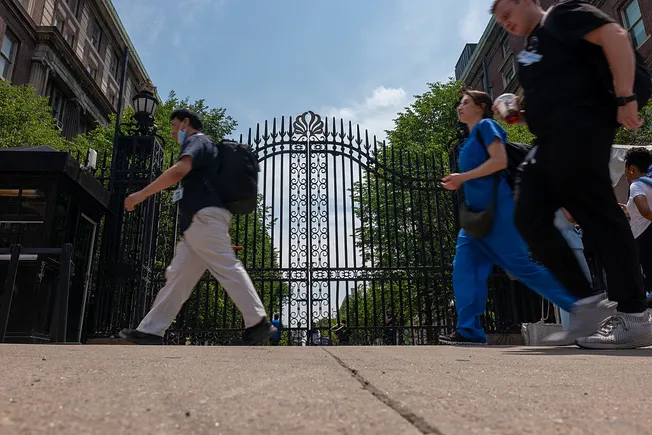In general, educators recognize the value of student feedback: it can help us better understand the classroom experience, modify learning activities, or adjust our policies and practices to improve student outcomes. Unfortunately, the most common form of feedback that instructors receive, the mandatory end-of-semester evaluation, is primarily intended to assess faculty rather than the teaching and learning experience. It rarely asks questions focused on student learning. Moreover, it takes place at a point in time that provides no opportunity to make the type of changes that might benefit the students who complete it (George, 2017; Holton, et al., 2016; Kahn, 1993; Medina, 2011; Nilson, 2016).
In contrast, the Midterm Student Feedback (MSF) mechanism, which is generally voluntary, is fundamentally focused on teaching and learning. The MSF asks students simple, direct questions focused on the teaching and learning process in their current course. Put more simply, it asks students to discuss what is and isn’t helping them learn (Dangel & Lindsey, 2014; Nelms, 2015; Payette & Brown, 2018; Ufland, 2020; Veeck, et al., 2016). The students’ feedback is then analyzed and used by the instructor to make any changes that he or she believes will help the students improve their learning outcomes over the course of the rest of the semester (Gooblar, 2017; Harris & Stevens, 2013; McGrath, 2014; Veeck, et al., 2016).
How It Works
The are several different forms of MSF that can be employed to attain feedback on the student learning process. For the purposes of clarity and simplicity, we feel that two are worth discussing here: the Small Group Instructional Diagnosis (SGID) and Bare Bones Questions (BBQ). While these methods vary in terms of the time and resources required to conduct them, all MSFs share certain key elements:
They must be conducted at a point in the semester when students have had enough time to become familiar with the course pedagogy, yet still early enough for meaningful changes to be made;
They must be a voluntary effort to improve learning, as opposed to an evaluation mandated by the institution;
They must be anonymous;
They must be conducted, analyzed, conveyed to the instructor, and discussed with the students in a timely fashion, usually within a week (Ufland, 2020).
Small Group Instructional Diagnosis (SGID)
The SGID is a collaborative form of MSF that requires the cooperation of a facilitator, typically a teaching and learning specialist or a trusted colleague. The process requires about thirty minutes of class time, so it is fairly efficient.
Before the evaluation, the facilitator and the instructor identify three or four open-ended questions to structure the MSF. The questions should encourage students to focus on the learning experience, not on the instructor. We’ve found the following questions effective:
What in this course has helped to improve your learning?
What in this course has hindered your learning?
Is there anything you would like the instructor to change?
On the day of the MSF, the instructor should introduce the facilitator and encourage students to be honest in their feedback, then leave the room. The facilitator then provides an overview of the process, divides students into groups of five to eight students, and asks them to discuss the three questions.
Once students have worked through the questions together, the facilitator reconvenes the full group and elicits responses. The facilitator records all the responses for the class but also takes note of those points that seem to represent a consensus. The facilitator asks follow-up questions as needed to understand the context in which the responses are being offered. If the suggested questions above are used, the third can serve to synthesize responses.
After the session, the facilitator writes a brief report synthesizing feedback from the class. The facilitator can use their judgment here: not all feedback needs to be shared, since the goal is to provide contextualized, actionable feedback. One way to achieve this more easily is to focus on those views that emerged as consensus points across the class. Indeed, one of the benefits of the MSF is that unhelpful feedback can be filtered out before the instructor sees it (Ufland, 2020). The facilitator may also provide a short, immediate “act now” list of items to the instructor and provide a more detailed report subsequently. This can enable the instructor to have an immediate discussion of the feedback with students, which is critical to the success of the model (Weimer, 2016).
Bare Bones Questions (BBQ)
The BBQ is a highly simplified form of midterm feedback that requires considerably less time than the more formal SGID. It also may be conducted without the assistance of a facilitator and can be effective in very small classes.
In this mode, the instructor provides written or digital copies of the questions – we suggest those listed above – to students near the end of a class session. The students then meet in small groups, compile their own responses, and elect one student to send the results to the faculty member. Once the students’ responses have been received the process of analysis continues in the same manner as that of an SGID (Ufland, 2020).
What It Does
The MSF has several clear benefits. For instructors, it provides nuanced, detailed feedback at a point in the semester when change is still possible. This feedback helps the instructor better understand the students’ experience and provides information about how to improve both the class environment and the learning process. Further, it helps build greater rapport between the instructor and students, as it shows students that the instructor values their input on the learning experience (Harris & Stevens, 2014; Holton, et al., 2016; McGrath, 2014). It also provides documentation both of teaching effectiveness and ongoing work to improve teaching effectiveness.
For students, it provides a forum to discuss their shared learning experience in the course and to identify shared challenges. Inasmuch as the instructor can make suggested changes, it can also enhance their learning experience. Perhaps most importantly, MSF provides a means of empowering students in the teaching and learning process. By providing students with an opportunity to collectively share their views and potentially effectuate change, students are given the chance to become active partners in the teaching and learning process and, in so doing, help improve their own learning outcomes (Berk, 2005; Harris & Stevens, 2013; Holton, et al., 2016; Kite, et al., 2015; Warner & Simmons, 2015).
Peter Ufland is Associate Professor of History at the University of the District of Columbia Community College. His latest research focuses on evaluation of history course syllabi in higher education and whether they conform to the best practices of teaching and learning.
Christian Aguiar is Assistant Professor of English at the University of the District of Columbia Community College. His research focuses on multimodal and collaborative assessments, approaches to teaching writing, and the experiences of first-generation and low-income college students in first-year composition.
References
Berk, Ronald A. “Survey of 12 Strategies to Measure Teaching Effectiveness.” International Journal of Teaching and Learning 17 (2005), no. 1: 48-62.
Dangel, Harry and Lindsey, Peter. “What are Students (Really) Telling Us?” The Journal of Faculty Development 28 (2014), no. 2: 27-33.
George, Phillis L. “Reimagining the Student Evaluation: Using Democratic Frameworks in College Teaching and Learning.” In Willermet, Cathy, et al., Promoting Social Justice through the Scholarship of Teaching and Learning. Indiana University Press, 2017.
Gooblar, David. “The Midsemester Course Correction.” The Chronicle of Higher Education (October 31, 2017) https://www.chronicle.com/article/the-midsemester-course-correction/
Harris, G.L.A. and Stevens, Danielle D. “The Value of Midterm Student Feedback in Cross Disciplinary Graduate Programs.” Journal of Public Administration Education 19 (2013), no. 3: 537-558.
Holton, Doug, Hajara Mahmood, Kathyrn Cunningham, Miriam R. Diamond, Mary Wright, CRLT, University of Michigan, Maha Bali, Susan Brown, Eulises Dominguez. Midterm Student Feedback Guidebook. (2016) https://bit.ly/msfguidebook
Kahn, Susan. “Better Teaching Through Better Evaluation: A Guide for Faculty and Institutions.” To Improve the Academy 12 (1993), no. 1: 111-126.
Kite, Mary E., Prabin C. Subedi, Kinsey B. Bryant-Lees. “Student Perceptions of the Teaching Evaluation Process.” Teaching of Psychology 42 (2015), no. 4: 307-314.
McGrath, Laura B. “Mid-Semester Evaluations: How to Do Some Spring Cleaning in Your Classrooms.” Inside Higher Ed (March 11, 2014). https://www.insidehighered.com/blogs/gradhacker/mid-semester-evaluations
Medina, Brenda. “As Emphasis on Student Evaluations Grows, Professors Increasingly Seek Midcourse Feedback.” The Chronicle of Higher Education (October 30, 2011). https://www.chronicle.com/article/as-emphasis-on-student-evaluations-grows-professors-increasingly-seek-midcourse-feedback/
Nilson, Linda B. Teaching at its Best: A Research-Based Resource for College Instructors, 4th ed. Jossey-Bass, 2016.
Payette, Patricia R., and Marie Kendall Brown. “Gathering Mid-Semester Feedback: Three Variations to Improve Instruction.” IDEA Paper No. 67, IDEA Center, https://eric.ed.gov/?id=ED588349
Ufland, Peter. “Empowering Students and Improving Learning Through Midterm Student Feedback.” The Cross Papers (2020), no. 23.
Veeck, Ann, Kelley O’Reilly, Amy MacMillan, Hongyan Yu. “The Use of Collaborative Student Evaluations to Provide Actionable Results.” Journal of Marketing Education 38 (2016), no. 3: 157-169.
Warner, Janis and Aneika Simmons. “Giving Voice to Students: A Preliminary Analysis of Midterm Evaluations and Procedural Justice.” Academy of Educational Leadership Journal 19 (2015), no. 1, 71-79.
Weimer, Maryellen. “Benefits of Talking with Students about Course Evaluations.” Faculty Focus, June 15, 2016. https://www.facultyfocus.com/articles/faculty-development/benefits-talking-students-mid-course-evaluations/



























